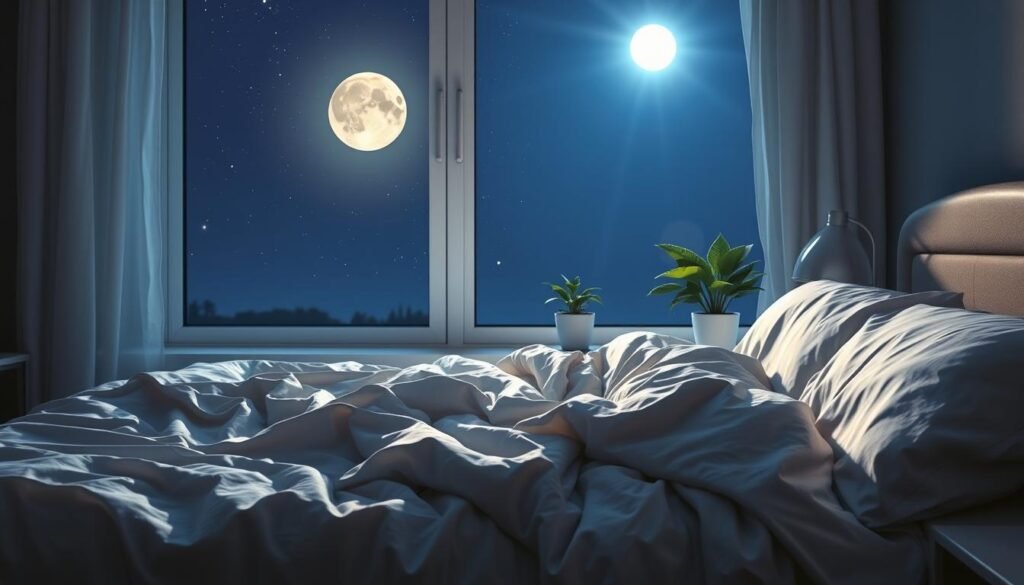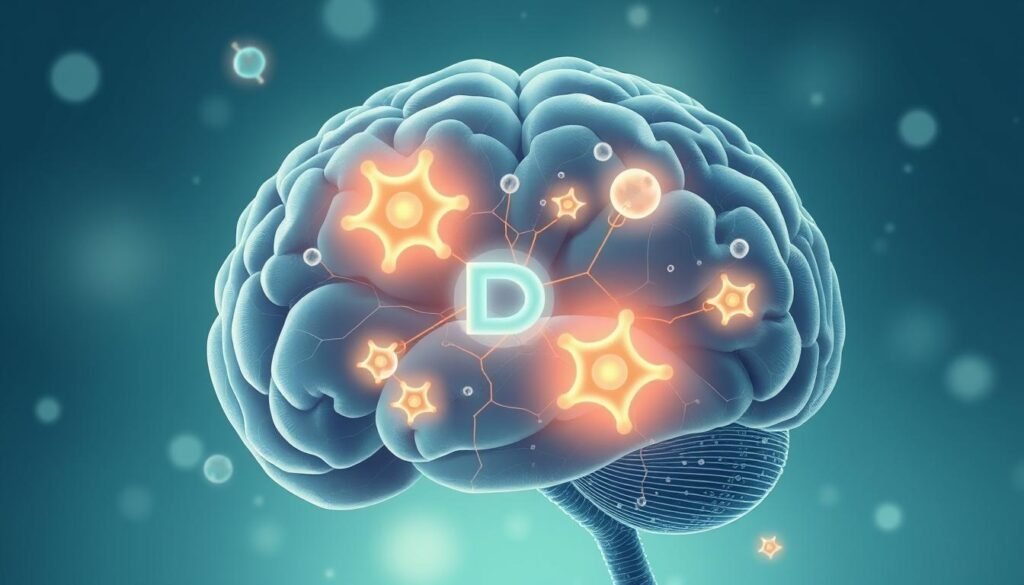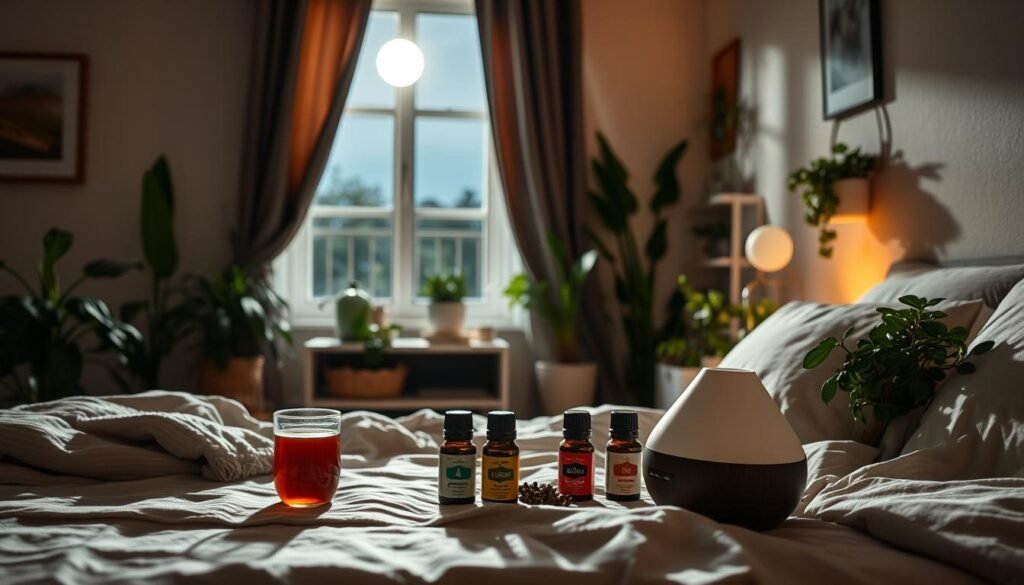Did you know over 59% of young adults have trouble sleeping? This fact makes it clear why it’s so important to understand insomnia’s causes. Vitamin D deficiency is a key factor in sleep issues, research shows. Low vitamin D can lead to insomnia and other sleep problems. So, people are turning to natural solutions to sleep better. This article explores how vitamin D affects sleep and how to improve it for those with vitamin D insomnia.
Key Takeaways
- Understanding vitamin D’s role in sleep can enhance sleep quality.
- Vitamin D deficiency is linked to common sleep disorders and inadequate rest.
- Natural sleep aids, including vitamin D, may improve overall sleep quality.
- Incorporating vitamin D-rich foods into the diet can combat deficiencies.
- Regular exposure to sunlight is crucial for maintaining optimal vitamin D levels.
Understanding Vitamin D and Its Importance
Vitamin D is key for our health. It helps our bodies use calcium, which keeps bones strong. It also helps our immune system, muscles, and brain work well. So, it’s important in our diets.
The Role of Vitamin D in Overall Health
It’s crucial to have enough vitamin D. Not having enough can lead to sleep problems. People with more vitamin D sleep better. Everyone should check their vitamin D levels. This includes young people, older adults, and those with long-term health problems.
Types of Vitamin D: D2 vs. D3
There are two kinds of vitamin D: D2 and D3. D2 comes from plants, and D3 comes from animals. D3 might be better at improving vitamin D in our blood. Knowing the difference helps us get the right amount of vitamin D.
Vitamin D Insomnia: Exploring the Connection
Recently, a lot has been said about vitamin D deficiency and sleep quality. Studies show that low vitamin D levels can mess with your sleep. This includes sleeping less and facing sleep disorders. For those dealing with vitamin D insomnia, it’s important to understand this link.
How Vitamin D Deficiency Affects Sleep Quality
People with low vitamin D often don’t sleep well. A study found that men over 68 with less than 20.3 ng/mL vitamin D slept less than five hours. Kids with vitamin D deficiency also had less sleep and bad sleep quality. This shows how crucial vitamin D is for good sleep.
Link Between Vitamin D Levels and Sleep Disorders
Low vitamin D levels and sleep problems go hand in hand among different people. For instance, those getting hemodialysis with sleep issues had low vitamin D levels. A case talked about a young woman with insomnia and daytime sleepiness from not enough vitamin D. Bad lifestyle choices and stress can make vitamin D’s impact on sleep worse.
Improving vitamin D levels could help people sleep better. We still need more research to understand this issue. But it’s clear we should pay more attention to it. For more in-depth details, check out this research article.
Sleep Disorders and Their Impact
Sleep disorders can greatly affect our health and may link to not having enough vitamin D. Low levels of this vitamin are found in those with sleep issues like insomnia and obstructive sleep apnea. Knowing about these can show us how crucial vitamin D is for good sleep.
Common Sleep Disorders Associated with Vitamin D Deficiency
Some sleep issues often tie back to not getting enough vitamin D. These include:
- Insomnia: This means you have trouble sleeping. It can get worse if your vitamin D is low.
- Obstructive Sleep Apnea: In this condition, you stop breathing for short periods while asleep. It’s linked to not enough vitamin D.
- Restless Legs Syndrome: This makes you want to move your legs when you’re trying to rest. It can mess with your sleep and might relate to low vitamin D.
Consequences of Poor Sleep Quality on Health
Not sleeping well can harm your health in big ways. Lack of sleep can mess with your mind and make you more likely to get heart disease or diabetes. People with sleep issues often face:
- Problems with thinking clearly and remembering things.
- A higher chance of feeling anxious or depressed.
- Being more stressed, which can hurt your health.
Getting why sleep matters is key to tackling sleep issues. It helps us look for ways to sleep better, like treating insomnia or getting enough vitamin D.

The Science Behind Vitamin D and Sleep Regulation
Vitamin D plays a key role in our body’s sleep patterns. Many studies show that having the right amount of vitamin D can improve sleep quality. This is because it helps manage melatonin, a sleep-regulating hormone.
The Influence of Vitamin D on Melatonin Levels
Melatonin controls when we sleep and wake up, and vitamin D levels can affect this. Having enough vitamin D helps create more melatonin, making sleep better. Those who don’t get enough vitamin D might find it hard to sleep well. This shows how crucial vitamin D is for good sleep. If you’re interested, you can learn more here.
Vitamin D Receptors and Brain Function Related to Sleep
Vitamin D connects to certain parts of the brain that manage our sleep. It supports brain functions that help us get enough rest. Not having enough vitamin D can mess with these brain functions, making good sleep hard to achieve. Knowing how this works is key to tackling sleep problems related to not enough vitamin D.

| Key Factors | Impact on Sleep |
|---|---|
| Vitamin D Deficiency | Increased risk of sleep disorders and shorter sleep duration |
| Melatonin Levels | Lower levels may lead to sleep disturbances |
| Vitamin D Receptors | Influence brain functions related to sleep-wake cycles |
| Serotonin Production | Indirectly affected by vitamin D; impacts mood and sleep |
Natural Solutions to Combat Vitamin D Insomnia
If you’re struggling with sleep problems due to low vitamin D, you’re not alone. Taking vitamin D supplements might help improve your sleep. However, it’s important to know the right amount to take. Always talk to a doctor first to get advice that fits your needs.
Vitamin D Supplements: Benefits and Considerations
Vitamin D supplements can help you sleep better if you’re not getting enough. Taking them regularly might help fix your sleep schedule. But, you have to be careful with how much you take. Doing blood tests can show if you need supplements and how much is right for you.
Dietary Sources of Vitamin D for Better Sleep
Adding foods rich in vitamin D to your diet can also help improve your sleep. Eat more:
- Fatty fish like salmon and mackerel
- Egg yolks
- Fortified items like milk, orange juice, and cereals
These foods not only increase your vitamin D levels but can help you sleep better too. For more help with sleep, looking into other natural sleep aids can be beneficial. Check out more tips on how to sleep better here. Eating right, getting enough vitamin D, and living a balanced life are key to good sleep.

How to Increase Vitamin D Levels Naturally
Many people have trouble keeping their vitamin D at healthy levels. This can impact health and sleep. Getting more vitamin D naturally, especially through sun and food, helps fix low levels. Knowing how to use these sources can make you sleep and feel better.
Sunlight Exposure: The Best Natural Source of Vitamin D
Getting sunlight is the top natural method to up vitamin D. UV rays make our skin create vitamin D. So, it’s key to be outside a bit. Try for 15 to 30 minutes of sun a few times a week. Skin type affects how long you need. But remember, put on sunscreen after a short time in the sun.
Foods Rich in Vitamin D to Include in Your Diet
Adding vitamin D-rich foods to your diet helps keep levels right. Top picks are:
- Fatty fish like salmon and mackerel
- Cod liver oil
- Egg yolks
- Mushrooms under UV light
- Fortified items such as milk, orange juice, and cereals
If you don’t get much sun, these foods can up your vitamin D and better your sleep. It’s a good idea to talk to a doctor about a vitamin D check if you’re worried about low levels. This test can spot problems. It helps manage health better.
Other Natural Sleep Aids to Consider
Exploring natural sleep aids is helpful for those wanting better sleep. Vitamin D, herbal remedies, and changes in lifestyle can make sleep better. These changes help fight sleep problems.
Herbal Remedies and Their Effects on Sleep Quality
Many herbal remedies help with sleep. Valerian root, for example, is used for insomnia and stress. It can help people relax and fall asleep faster. Chamomile tea, with its flavonoids, can also make you sleepy and less anxious.
L-theanine in green tea reduces stress and helps calmness. Lavender oil smells soothing and makes for a calm sleep space. GABA, a brain chemical, may also help with sleep when taken as a supplement.
These herbs are good for stress and anxiety management. These are important to handle for better sleep. Using these before bed can help you sleep better.
The Role of Sleep Hygiene in Improving Restful Sleep
Sleep hygiene is about habits for good sleep. Having a regular sleep schedule and a comfy sleep space matters. Avoid screens before bed to sleep better.
- Keep a regular sleep and wake time to set your body clock right.
- Make sure your sleep space is dark, cool, and quiet.
- Stay away from caffeine and nicotine before bed.
Focusing on sleep hygiene improves sleep a lot. Together with herbal remedies, they form a great strategy. For more on sleep issues, check out this resource.
Potential Risks of Vitamin D Supplements
Vitamin D supplements have benefits, but we must understand the risks. It’s important to take the right dose. Also, knowing how it reacts with other medications is key to staying safe.
Understanding the Right Dosage and Administration
Finding the right vitamin D dosage is crucial. Taking too much can cause nausea, vomiting, and hurt your kidneys. Everyone’s needs are different, based on age and health.
That’s why talking to a doctor is important before starting. They can help figure out how much you need. Checking your blood levels regularly is also a smart move. This helps adjust the dose if necessary.
Possible Interactions with Other Medications
There can be issues when vitamin D is taken with other medicines. Some drugs, like corticosteroids and certain diet pills, can lower how much vitamin D your body gets. This can lead to not having enough vitamin D.
Other medications might mess with your calcium levels, causing problems. This is why being open with your doctor about all the medications you’re taking is important. It helps ensure your vitamin D supplementation plan is safe and effective.
Conclusion
Maintaining healthy levels of vitamin D is key to better sleep. A look at 19 different studies showed clear benefits. People who took vitamin D slept better compared to those who didn’t. This proves that vitamin D could be a big help for sleep.
But it’s important to say that the impact of vitamin D on sleep isn’t the same for everyone. More research is needed to understand its effects fully.
Adopting a well-rounded approach is essential to fight vitamin D insomnia. Getting enough sunlight and eating foods rich in vitamin D are great steps. These natural methods can improve sleep quality.
If you can’t get enough sunlight or vitamin D from your diet, supplements are a good backup. They help fix vitamin D shortages that many people face.
The evidence shows focusing on vitamin D levels can make sleep better. Many people struggle with sleep problems. Turning to natural solutions like vitamin D can help them find peace at night.
Yet, we need more research to explore vitamin D’s role in treating sleep disorders fully. To dive deeper into this topic, check out this detailed study.